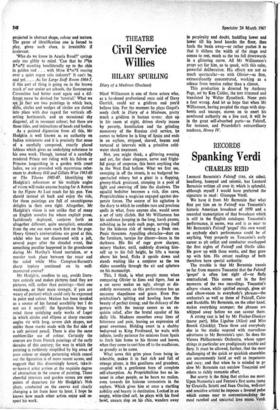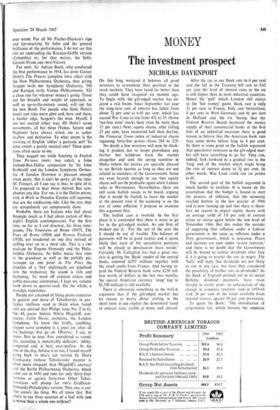Spanking Verdi
RECORDS CHARLES REID
Leonard Bernstein's Falstaff (css, six sides), headlong, honeyed and seismic, has Leonard Bernstein written all over it; which is splendid, although myself I would have preferred the signature to read: Giuseppe Verdi.
We have it from Mr Bernstein that what first put him on to Falstaff was Toscanini's historic American broadcast of 1950 and a recorded transcription of that broadcast which is still in the English catalogue. Toscanini's performance, it seems, was and is as near to Mr Bemstein's Falstaff `go§pel' (his own word) as anybody else's performance could be of anything. Very properly so. Toscanini's early career as pit cellist and conductor overlapped the first nights of Falstaff and Otello alike. He grew up with these works, and they grew up with him. His extant readings of both therefore have special authority.
The trouble is that Mr Bernstein travels so far from maestro Toscanini that the Falstaff 'gospel' is often lost sight of—or flatly contradicted. This comes out in the first moments of the two recordings. Toscanini's allegro vivace, while spirited enough, gives air and elbow-room to everybody's phrases—the orchestra's as well as those of Falstaff, Caius and Bardolfo. Mr Bernstein, on the other hand, makes everything scamper; the phrases are whipped away before we can savour them.
A strong cast is led by Mr Fischer-Dieskau (name part), Miss Ligabue (Alice) and Miss Resnik (Quickly). These three and everybody else in the studio respond with marvellous adroitness to Mr Bernstein's spur. So does the Vienna Philharmonic Orchestra, whose upper strings in particular are prodigiously nimble and fiery. It must be allowed, further, that the most challenging of the quick or quickish ensembles are uncommonly lucid _as well as impetuous and racy; and that when he is minded to go slow Mr Bernstein can outslow Toscanini and others to richly romantic effect.
But scurry is the thing that strikes me most. Upon Nannetta's and Fenton's first scena (sung by Graziella Sciutti and Juan Oncina, well-cast and sensitive artists) he imposes a fevered pulse which comes near to conventionalising the most rarefied and uncarnal love music Verdi
ever wrote. For all Mr Fischer-Dieskau's ripe and lip-smacking Sir John and the general brilliance of the performance, I do not see this CBS set superseding the Karajan-Gobbi version (Columbia) or, for that matter, the Solti- Geraint Evans one (RCA-Victor).
For HMV, Sir Adrian Boult, who conducted the first performance in 1918, has done Gustav Hoist's The Planets complete (two sides) with the New Philharmonia Orchestra, thus giving Sargent (with BBC Symphony Orchestra, '59) and Karajan (with Vienna Philharmonic, '62) a close run for whatever money's going. Those out for breadth and weight of approach, as well as up-to-the-minute sound, will opt for the new Boult. For people who think Hoist's music can take more glint and, here and there, a harder edge, Sargent's the man. Myself, I am not excited either way. Of Hoist's seven movements, all but three (Venus, Saturn and Neptune) have always struck me as rather shallow and derivative. To what extent is the reviving of English 'oldies' a patriotic act? To what extent a purely musical one? These ques- tions often occur to me.
They nagged me while listening to English Tone Pictures (my, two sides), a John Ireland-Bax-Delius symposium by Sir John Barbirolli and the London Symphony Orches- tra. A London Overture is pleasant enough when perky. But it can't be perky all the time. Of Tiniagel, all I can say is that, in spite of it, I'm prepared to hear those shelved Bax sym- phonies any day. For me, it is the Delius pieces, with A Walk to Paradise Garden still supreme, that are the vindicating side. Like the rest, they are scrupulously yet sumptuously done.
Probably there are Italians who feel about Respighi much as I feel about certain of Res- pighi's English contemporaries. For the first time, so far as I can discover, his three tone- poems, The Fountains of Rome (1917), The Pines of Rome (1924) and Roman Festivals (1928), are bracketed on one disc instead of spilling over on to a third side. This is a CBS package by Eugene Ormandy and the Phila- delphia Orchestra. As befits music that runs to the grandiose as well as the pallidly pic- turesque (at one point in The Pines the chuckles of a 'live' nightingale are pipelined into the orchestra), the sound is rich and deafening. To ward off eviction orders and public-nuisance summonses, I kept my volume knob down to quarter-cock. On the whole, a nostalgic experience.
People not ashamed of liking piano concertos in general and those of Tchaikovsky in par- ticular (millions used to blush when found out) are advised that Philips issue No. 2 in G, Op. 44, uncut. Soloist, Nikita Magaloff; con- ductor, Colin Davis; orchestra, the London Symphony. To know this lordly, rambling, elegant score complete is a great joy after all the hackings that go on. Observe: I say, to know. Not to hear. For, considered as sound, this recording is remarkably deficient: tubby, congested and, at best, over-mellow. At the end of the day, believe it or not, I found myself going back to mu's cut version by Shura Cherkassky (whose Tchaikovsky manner is often more eloquent than Magaloff's anyway) and the Berlin Philharmonic Orchestra, which came out in 1956 and runs for only thirty-four minutes as against forty-two. Other Tchai- kovskians will plump for css's Graffman- Orrnandy-Philadelphia version. This, too, is cut. The score's the thing. We all know that. But who's to say three quarters of a loaf with jam is worse than a whole one without?



































 Previous page
Previous page